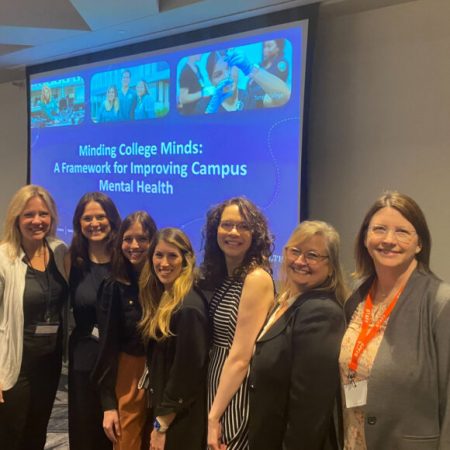
Moody Grant Recipient: Meadows Mental Health Policy Institute
- Can you tell us more about the Meadows Mental Health Policy Institute and how it is working to become a national leader in treating all people with mental health needs?
The vision of the Meadows Mental Health Policy Institute is simple: We see Texas as a national leader in treating all people with mental health needs. To accomplish this, the Meadows Institute provides independent, nonpartisan, data-driven, and trusted policy and program guidance that creates equitable changes at the systems level so all people can obtain effective, efficient behavioral health care when and where they need it.
Founded in 2014 with a grant from the Meadows Foundation, we are based in Texas and have locations in Amarillo, Austin, Dallas, El Paso, and Houston, with projects in every corner of the state. Today, the Meadows Institute has expanded its reach to become one of the nation’s most trusted sources for information and analysis of effective mental health care policy and programs at the local, regional and national levels.
How We Work: At the Intersection of Policy and Practice: Unique within the mental health ecosystem, the Meadows Institute is a ‘think-and-do tank’ that works at the intersection of policy and practice to advance transformative solutions in mental health care. We lead efforts in shaping and enacting mental health policies, alongside driving the development, implementation, scaling, and financing of evidence-based solutions across local, state, and national systems. Our innovative model fosters a continuous cycle where policy initiatives translate into impactful local practices, and insights from our on-the-ground work inform and shape future policymaking. Rooted in collaboration and partnership, we champion evidence-based strategies, consistently refining our approach to achieve enduring impact in mental health care, with a steadfast commitment to nonpartisanship and stewardship.
Our Priorities Areas: Making the Greatest Impact: We have identified the following as the most impactful opportunities to solve our mental health crisis and ensure that people suffering have access to the care they need, when and where they need it.
- Children and Families: Ensuring that all children and families get the mental health support they need, through:
- Student and educator emotional wellness: Transforming the way student and educator emotional needs are identified and supported within K-12 and higher education school settings.
- High need youth: Working across systems at the community and state levels, especially child welfare and juvenile justice, to improve mental health services and supports for children and youth with complex needs.
- Trauma and Loss: Increasing awareness of the significant roles of childhood trauma and grief in predicting future behavioral health problems and increasing access to best practice care for those who have experienced trauma and/or loss.
Health Systems: Partnering with health systems to enable all people to receive quality mental health care across the continuum of need, through:
- Primary care integration: Making primary care settings the first point of contact for mental health care to enable early prevention, detection, and treatment for children and adults.
- Improving Specialty Care: Ensuring that across their lifespan, people with serious mental health needs receive best-in-class specialty care.
Justice and Health: Diverting people from the justice system, improving how the justice system interacts with people with mental illness, and improve crisis response to promote the well-being of people with mental illness, their families and the community.
We also have priorities that inform and support each of these areas: trauma and grief, expansion of the mental health workforce, health equity, and innovation in health care.

- How, when, and why, was MMHPI started? How was this need for mental healthcare identified and how is your organization working to make a difference in that area?
The Meadows Institute grew out of The Meadows Foundation’s unyielding concern for the people of Texas. In 2014, The Meadows Foundation established the Meadows Institute as an independent nonprofit organization. As the nation’s mental health crisis grew, we believed that effective treatment options were available but that our health systems were not designed to implement them effectively. We are leading efforts to change that.
We face a severe mental health crisis. Each year, more than one in five Americans struggle with a mental illness, with the number rising to one in three for young adults aged 18 – 25. Yet in 2021—the most recent year for which we have data—fewer than 50% of those suffering received care. For those who do get care, it is on average eight-to-ten-years after they first began experiencing symptoms. This in part because more than 160 million Americans live in designated mental health professional shortage areas.
Our children and youth are at the epicenter. It is important to understand that mental illness is a pediatric disease. More than 50% of all mental health conditions emerge by age 14, and 75% by age 24. One in six children across the nation experience a mental health disorder each year; in Texas, that number rises to one in three. Rates of anxiety and depression among children and adolescents have increased by 23% since 2020, and suicide has become the second-leading cause of death of children and young adults aged 10 – 24. Youth in underserved areas and those who are in low-income families or minority groups have been particularly impacted by behavioral health challenges.
Compounding matters, mental health and substance use disorders often co-occur with each other as well as with other chronic health conditions (such as heart disease, diabetes, and cancer) and intellectual disabilities. Yet few receive specialized treatment, making both the mental, developmental, and physical health conditions harder and more costly to address.
These numbers, while stark, do little to capture the pain or suffering of someone living with a mental health challenge—or the emotional and financial toll it can take on their family, friends, and community. Mental health affects everyone. But there is hope. Mental illness is treatable. In fact, 70 – 90% of people with mental health needs will get better when provided with best practice treatment and psychosocial supports.
- How does MMHPI turn policy and ideas into implementation and systems transformation at the national, state, and local levels?
Since our inception, we have focused single-mindedly on our mission of bringing Texans the mental health care they need, when and where they need it. We have identified systemic policy and financing levers and worked alongside top leaders in government, industry and academia to develop effective, actionable, and sustainable solutions.
Because of the Meadows Institute, thousands of people suffering mental health crises have been diverted from jails, tens of thousands of students have received same-day, urgent care at school, and millions of people are receiving care in health systems committed to ending untreated depression.
Policy Guidance: The Institute provides non-partisan, data-driven, and trusted mental health policy and program guidance to legislators, government agencies, and their staffs at the local, state, and national level, helping them craft and implement policies that can help more people more effectively and equitably. We partner with leaders to identify and prioritize policy solutions. Moreover, we provide them with the necessary research and analyses of mental health policy strategies and evidence-driven approaches through public white papers and expert testimony. As crucial events unfold, our team gathers and analyzes information, studying potential effects on mental health and substance abuse, and leveraging legislative opportunities as they emerge. We always focus on the goal of advancing policies—and securing funding for—programs that ensure people have improved access to quality mental health care.
Local Health System Transformation: The policies we develop must be implemented on the ground in healthcare systems in Texas and across the nation. The Meadows Institute works with communities and organizations to implement the improved policies we get enacted, as well as conduct in-depth, expert assessments of local mental health systems to identify additional needs and opportunities. The best health systems are proactive, designed to detect and treat illness long before it reaches a crisis level. Meadows Institute helps Texas communities move from reactionary, crisis-focused efforts to building comprehensive systems of care centered on early detection and person-centered, evidence-driven treatment.
Innovate, Implement, and Scale Effective Programs: From scaling revolutionary new justice diversion programs from North Texas across the country, to reshaping how schools across the state can better support student and staff mental health, to building a workforce of culturally and linguistically competent community health workers empowered by cutting-edge digital tools and evidence-informed approaches, the Meadows Institute is shaping Texas into an ecosystem to scale effective, efficient, and equitable behavioral health solutions across our state and the nation. At our core we partner with leading Texas and national experts to design and adapt innovative programs for real world implementation.
- How is your work implemented in the individual school systems?
The Meadows Institute wants to support Texas children, youth, and families where they are: in our over 1,200 K-12 school districts and over 75 institutions of higher education. Texas is home to roughly seven million K-12 and postsecondary students, and Texas educational institutions employ 371,778 educators and roughly 80,000 other professional staff (Texas Education Agency, 2023). Texas educates 1 in every 10 students in the U.S., and 1 out of every 8 low-income students. We know that everything is bigger in Texas and that only a comprehensive, sustainable, large-scale response can meet the demands of a state this large and diverse. The Meadows Institute is prepared to meet the challenge.
Over the last four years since the pandemic, an ever-growing number of K-12 school districts, colleges, and universities in Texas are coming to the Meadows Institute for guidance on how to support the mental health and wellbeing of students and staff, particularly in the aftermath of recurring natural disasters and school shootings in Texas. Every day we hear from school district and higher education leaders who feel overwhelmed and under supported without a network of colleagues to learn from and without guidance on the most effective evidence-based tools to use. We have learned by working with districts and institutions of higher education over the past decade that, even now, very little practical guidance exists for Texas school leaders on how to support student and staff mental health.
We know that schools and higher education institutions alone cannot do everything, nor do we expect them to be mental health providers, but Texas education institutions are where you find children, young adults, and families, and they are a trusted, non-stigmatizing, highly effective venue for providing comprehensive mental health and wellbeing supports, if done right. The Meadows Institute is working directly with school campuses, K-12 school districts, and postsecondary institutions to develop robust, comprehensive school mental health systems that can meet the needs of all students and staff, whatever their mental health needs.

- What successes have you seen to date?
Thanks to the Moody Foundation’s support, the Meadows Institute has been able to dramatically expand and scale our support to both K-12 districts and colleges and universities in Texas over the last two years, and we are only just getting started. We have worked at the state, regional, institutional, campus, and community level to put school mental health research, policy, and best practices into action—and into the hands of educators who do the work and need help building systems that support student and staff mental health and wellbeing.
Below is a brief summary of just some of our accomplishments over the last two years thanks to the Moody Foundation’s generous expansion grant:
- Through Texas Child Health Access Through Telehealth (TCHATT), more than 1 million Texas students in 823 Texas school districts can now access telehealth services, with a goal to serve all 5.5 million Texas students.
- We have developed new partnerships with seven Education Service Centers (ESCs) (Regions 8, 10, 11, 13, 16, 19, and 20) with long-term plans to support all 20 ESCs in the state. These seven ESCs collectively support 426 Texas school districts serving over 2 and a half million students in Texas. (This builds on our earlier work with ESCs in Regions 2, 3, 4, and 5 after Hurricane Harvey.)
- We have dramatically expanded our support for mental health and well-being programming so that we are now directly supporting 81 Texas K-12 school districts serving 1,844 schools, 1.2 million students, and almost 160,000 full-time staff in West Texas, North and Central Texas, Southeast Texas, and Northeast Texas. In total, this is over one-fifth of all Texas K-12 students.
- We have kicked off a new portfolio of work in post-secondary education and have served 34 institutions of higher education in Texas representing over 640,000 college and university students across the state, which is about half of all college students in Texas.
- The San Antonio Mobile Mental Wellness Collaborative is currently serving 4 school districts, 98 schools, nearly 57,000 students, and nearly 3,900 educators in Bexar County with plans to expand to more districts soon. As a result of the San Antonio Executive Learning Community, local districts implemented 44 new mental health interventions in the 23-24 school year. The Youth Leadership program has expanded to include middle and high school students in two partner districts with plans to include a summer program this year to train even more youth leaders.
- Tell us more about your relationship with the Moody Foundation.
The Moody Foundation has been a critical partner of the Meadows Institute for almost a decade. In our early days, the Moody Foundation gave the Meadows Institute one of our first grants to do an assessment of mental health needs for children and youth in North Texas. That early work helped to inform all the work we do to support children, youth, and their families through the Meadows Institute’s Center for Child and Family Wellness.
In 2022, the Moody Foundation made a grant to the Meadows Institute to dramatically expand our school mental health services to respond to the urgent mental health needs of children, young adults, and their families in Texas. The most recent grant from the Moody Foundation allows us to continue to scale this work across Texas. Our long-term goal for our partnership with the Moody Foundation is ambitious: for the Meadows Institute to be able to support the mental health needs of every child, youth, and family in Texas – beginning in our K-12 and higher education systems.
What we have been able to do in a very short time with the Moody Foundation’s early investment clearly demonstrates that we can continue to scale this work across the state to reach all students and serve as a national model for how to best support student and staff mental health and wellbeing. The Moody Foundation grant has given us the capacity to build a curriculum of evidence-based mental health strategies and tools and a platform for providing both K-12 districts and higher education institutions with the guidance and coaching needed to implement best practices. This initial grant has also allowed us to better understand the gaps and pain points that school districts and higher education institutions are experiencing, which is now giving us the opportunity to provide more intensive supports to districts in areas such as school discipline reform (breaking the school to prison pipeline), data collection, workforce solutions, and long-term strategies to fund and sustain school mental health programs over time.
The Meadows Institute is unique not just in Texas but in the country as a nonprofit leader that works across child-serving systems (K-12 education, higher education, child welfare, juvenile justice, and health systems) to create equitable systemic changes so that all children, youth, and families in Texas can obtain the health care they need. Using a community-centered, cross-systems, collaborative focus, our goal over the next few years is to be able to continue to scale this cross-systems work across the state through our Meadows Institute Center for Child and Family Wellness so that we can support children, youth, and families in whatever system they find themselves in, whether that is through their pediatrician’s office, a juvenile justice facility, a community based mental health clinic, a foster home, or a school. Together, we can work towards our shared vision of making Texas the national leader in treating all children, youth, and families with mental health needs.
- Upcoming events or key milestones we should highlight?
The Meadows Institute has so much going on – there simply isn’t space to mention it all here – but below is a sample of just a few recent highlights!
- The Meadows Institute has celebrated its tenth anniversary, a major milestone!
- We were recently spotlighted on Health Uncensored with Dr. Drew. In this episode, Dr. Drew interviews Chief Medical Officer Dr. Roshni Koli, who discusses the rising concerns around anxiety and depression in school-age children and provides practical advice for parents to better understand and support their children’s mental health. She also touches on the importance of early intervention and the role parents can play in identifying signs of mental health struggles. To watch the full interview, start here.
- Today the Meadows Mental Health Policy Institute, alongside partner Headstream (an innovation program created by SecondMuse ), announced the launch of the novel K-12 Mental Health Tech Navigator. The Navigator is a free, web-based resource for K-12 administrators and educators designed to inform and guide the process of using digital tools to support the mental health and wellbeing of students. You can find it
- We are launching a new series of webinars around important contemporary issues – such as social media’s impact on youth mental health and the U.S. Surgeon General’s recent advisory on the mental health and well-being of parents – presented by Meadows Institute experts. These will be made available to any interested group, and for our Texas State of Mind Society members, we are also coordinating in-person viewings.
- How can people get involved?
One of the most impactful ways to get involved is to join our Texas State of Mind Society (TSOMS), our membership group dedicated to raising awareness and building support for the Meadows Institute and our work in Texas. Members gain education, knowledge, and relationships essential to improving mental health care for themselves and their neighbors, engagement in a community of people who share their commitment to this cause, and hope and satisfaction from knowing they are making a real difference in the lives of Texans who too often suffer alone. Members can additionally look forward to in-person events each year that engage, inform, and educate the community about timely and pressing issues related to mental illness and mental health care, private invitations to additional events and briefings with experts, curated information and resources, and insider communications regarding the Meadows Institute’s work and the work of our collaborative partners. A TSOMS charter membership is $2,500 a year.
Beyond TSOMS, donations of any size help sustain and grow our work. Every dollar contributes to our work transforming mental health care systems in Texas and beyond and positively impacts systemic change for all Texans.
Additionally, by following and engaging with us on social media and our website, people can help get the word out about key mental health issues. We regularly publish posts that highlight our work and achievements, educate about policy priorities, and make vital resources accessible:



